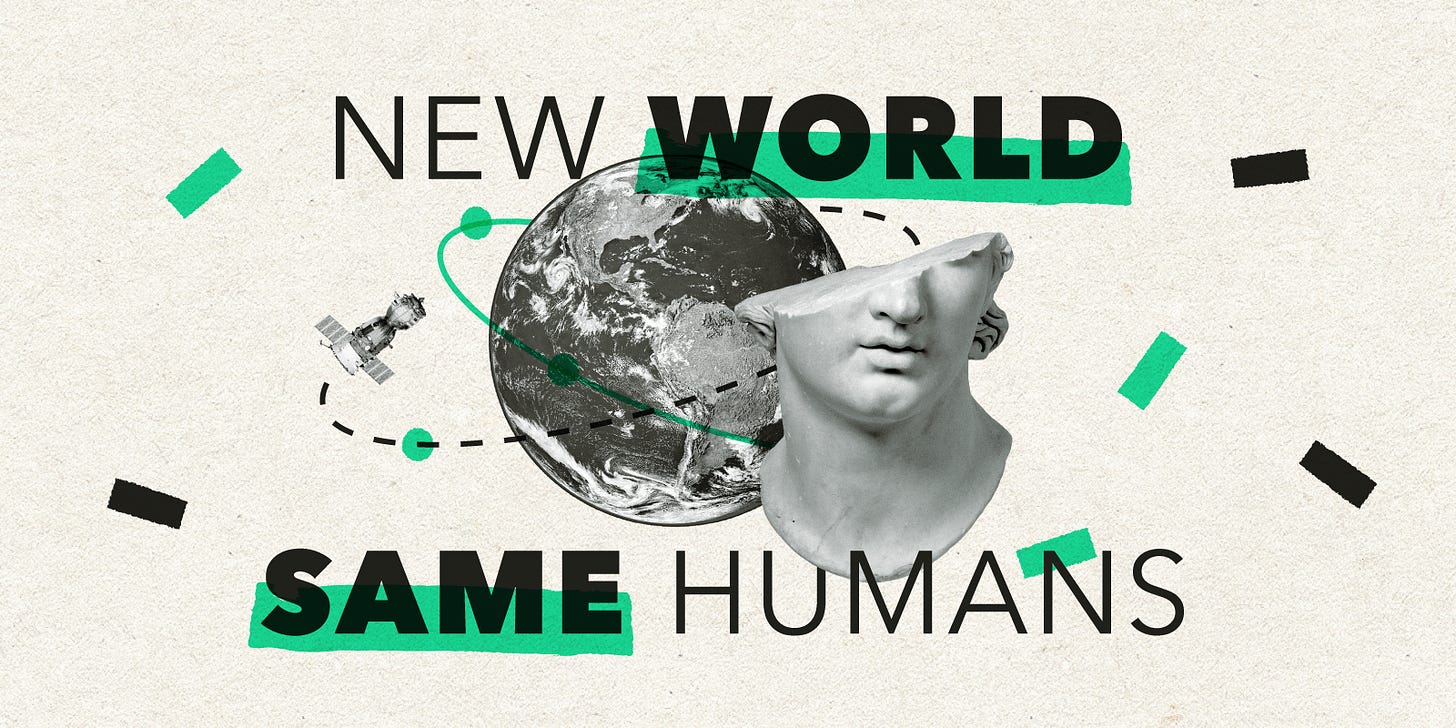New World Same Humans #24
Who controls the thinking machines? Where next in the eternal human quest for meaning?

Welcome to New World Same Humans, a weekly newsletter on trends, technology, and society by David Mattin.
If you’re reading this and you haven’t yet subscribed, then join 9,000+ curious souls on a journey to build a better shared future 🚀🔮
🎧 If you’d prefer to listen to this week’s instalment, go here for the audio version of New World Same Humans #24. 🎧
Back in NWSH #13 I wrote about Big History, and its project to find overarching narratives that make sense of our past, present and future.
I had some criticisms of that project. But I situated those criticisms inside a broader acceptance that New World Same Humans owes much to this intellectual trend, and shares many of its aims.
That alliance is evident this week. While last week’s instalment was a long essay, this week I want to share two early-stage thoughts. Both of them are attempts to tell a coherent story about long-running historical forces that will do much to shape our future. First, the emergence of nonhuman intelligence. Second, the eternal human quest for meaning.
Think of these two short pieces as thought starters. I hope they provoke you towards new points of view: agreement, disagreement or somewhere in between. And I’ll be returning to the ideas discussed here in the months ahead.
Who controls the thinking machines?
When it comes to the long view of human history, one of the big ideas in circulation right now is that we’re at an intelligence-fuelled inflection point.
An inflection point, to be specific, caused by the emergence of nonhuman intelligence. So runs this argument: since our emergence around 300,000 years ago, homo sapiens have been the most intelligent being on the planet, and our history – including our overwhelming dominance as a species – has been shaped by that advantage. But now we’re building machines with intelligence: commonly called AIs. Machines, in fact, that will far surpass humans in some domains of intelligence. Thinking machines. And that’s a revolution.
This is the central idea in James Lovelock’s short book The Novacene, which I wrote about in NWSH #1. Lovelock thinks we should embrace the arrival of nonhuman intelligence, because intelligence is the universe waking up into an awareness of itself, and this marks the next stage in that story.
Before we embrace our cosmic destiny, though, it strikes me that we face a key question. That is: who controls the thinking machines we’re building? I wonder if this could be the most important political question – that is, the most important question about our collective lives – that we face right now.
Two distinct answers are emerging.
The first has its roots in the US, and it says that the thinking machines we’re creating are best controlled by corporations. If this answer is allowed to play out in the decades ahead, we’ll come to live in a world in which the corporations that control our thinking machines will dominate our collective lives. I’ve written before about how Google, Facebook, Apple and others now wield a new form of socio-corporate power that we don’t fully understand yet. In a world of corporation-controlled thinking machines, we can multiply that by a thousand.
The second answer has its roots in China, and it says that our new thinking machines should be controlled by the state. If this answer is allowed to play out in the decades ahead, we’ll see the continued emergence of an entirely new kind of techno-authoritarianism that will rival liberal democracy as the preeminent system for the organisation of our collective lives. This system is emerging already: see the AI-fuelled social credit rating system and the Total Surveillance it promises to impose on the Chinese people. The fatal problem for 20th-century authoritarianism was that centralised information processing is extremely inefficient. AI solves that problem, meaning you can have a totally centralised government that is also effective.

Two rival systems; two rival paths for the future. Of course, it’s likely we’ll see both answers develop in parallel. Let that play out, and you can imagine a world increasingly divided between two different systems. But given the tension between them, is a clash inevitable? How do we deal with that?
All this ties into another strain of my thinking, which is around the idea that much of what we call politics these days is estranged from the truly important contemporary questions we face. It sometimes feels that our day-to-day politics has become a kind of hologram: a lightshow that draws away our attention while the realities – about our shared future, and about power, who has it, and how it works – are playing out elsewhere.
Will we look back one day and tell ourselves that the most important political question we faced in 2020 was one we spent, relatively speaking, little time talking about? Not the fight between Biden and Trump, or between populists and globalists, but between two competing visions for human oversight of nonhuman intelligence?
Two thoughts to end on:
There is a third way. The EU wants a hybrid model: corporate control overseen by state regulation.
And all this depends on the assumption that we can ‘control’ the thinking machines at all. Arguably, we humans have already lost control of the technologies we’ve built. We might have to lower our expectations, and settle for wielding influence over the nonhuman intelligences we create.
Touch the screen
Often find yourself lost for small talk? This week, why not side step that social expectation entirely and instead force your conversation partner to engage with one of these Very Important Issues:
Quibi is a 1.75 billion dollar rival to Netflix that promised a media revolution via short-form, mobile-first drama and entertainment. Launched in April, it has been a spectacular flop. Why? I think it’s because Quibi positioned itself around a new type of content format. But audiences care about compelling human stories, not content formats. Innovators, take note!
The Chinese government is moving in on Hong Kong, which has become a colony once again according to this piece in the Atlantic. The competition between liberal democracy and the new form of techno-authoritarianism that’s emerging in China is a NWSH obsession.
A YouTuber called Mr Beast ran a competition with one simple rule: the winner is the last person to take their finger off a specially-created app on their phone screen. He had to call off the contest early when three players managed 72 hours of continuous pressing. Each player won $20,000. The internet is insane.
Everything must go
Humans are meaning-making creatures. I’m fascinated by the way our quest for meaning – the deep need to give our lives an explanation or purpose that reaches beyond ourselves – shapes our individual and collective histories.
Here’s a quick thought about that quest, how it went in the 20th-century, and where it’s heading next.
When it comes finding meaning in our lives, we inhabitants of modernity are in an unusual position. Across most of human history meaning was imposed from above, as it were, by a set of beliefs – in gods, or God, origin stories, afterlives and so on – that allowed people to situate themselves within an all-encompassing story about Life, the Universe and Everything.
But modernity stripped us of that consolation. The message of the scientific revolution was: the gods are not real, humans are not the centre of creation, we are alone and insignificant.
Modernity tends to strip people of traditional sources of meaning in more prosaic ways, too. One key way it does that is by uprooting them from their families and traditional communities and pouring them into large cities. Read many histories of the late 19th or early 20th-centuries, and you see that in action: all across Europe industrialisation pulled millions away from traditional agrarian communities and into big cities. The result was a new urban class that suffered from peculiarly urban feelings of meaninglessness, alienation, and atomisation. Part of their response was to develop a new romanticisation of the agrarian life they’d left behind. Disoriented by urban existence, they developed an ersatz nostalgia for the old ways: the land, the soil, the folk, the authentic people.
That nostalgia helped lay the groundwork for new forms of nationalism, and in turn for fascism. By 1945, that pathway towards meaning had been revealed as hollow, dark, and ultimately murderous. Like much of Europe, it had turned to ashes.

What came next? One answer that it’s possible to make a case for is: the consumer society. Devastated by war, European dreams of the folk faded and people instead turned to a new form of life, the life of mass consumerism, that was emerging in the US. This was a form of life that encouraged millions to find meaning in the acquisition of new products and the enjoyment of new comforts. It was underpinned by the formalisation of practises such as public relationships and branding; one of the intellectual fathers of these practises, Edward Bernays, wrote extensively about how corporations could use psychological techniques to manipulate consumers and trigger their herd instincts.
To me this idea – that mass consumerism can in some sense be seen as what came after fascism – seems wild and strange. But try to tell a Big Story about the quest for meaning in the 20th-century, and it’s one of the possibilities you see. It doesn’t, of course, mean that the two are in any way morally comparable: they clearly are not. Just that as one system faded, another rose to take its place.
In 2020, though, I think we’re on verge of yet another new chapter. The ability of consumerism to offer meaning in people’s lives is fading. We’re so affluent now that flashy products don’t confer status the way they used to. We’re saturated in the kind of experiences that would have been one in million back in the day. And our consumption is now being overlaid by guilt over the negative impacts on the planet, others around us, and even ourselves.
So what comes next in the Big Story about meaning? That’s a question we’ll come back to many times in NWSH. But I think that a part of the answer may lie in virtual and simulated worlds, and how they are becoming new domains of meaning and life experience. Check out this new video game, Among Trees, from Fortnite creators Epic Games, to get a glimpse of what I mean.
Who needs self-lacing shoes?
Thanks so much for reading this week. I hope New World Same Humans is proving useful to you, and helping to fuel your thinking when it comes to where we’re at now and what you should do next.
Understanding more about our shared future has been a lifelong obsession for me. And while I’m still waiting for the self-lacing sneakers we were promised in Back to the Future, that obsession is only intensifying.

Nike actually make these shoes now! I just don’t have a pair.
When it comes to NWSH, this newsletter is just the first iteration. In the weeks ahead I’ll continue to plan all kinds of new content formats. All of them will be intended to share new ideas, perspectives and evidence on our shared past, present and future with the NWSH community Any thoughts on what you’d like to see? Email me!
In the meantime, we can make our community more powerful in one important way: by growing it.
So if you found today’s instalment useful, please forward this email to one person – a friend, family member or colleague – who’d also enjoy it. Or share New World Same Humans across one of your social networks, and let people know why you find this newsletter valuable:
The more great people who join our community, the better for all of us!
Until next week, thanks for reading,
David.


